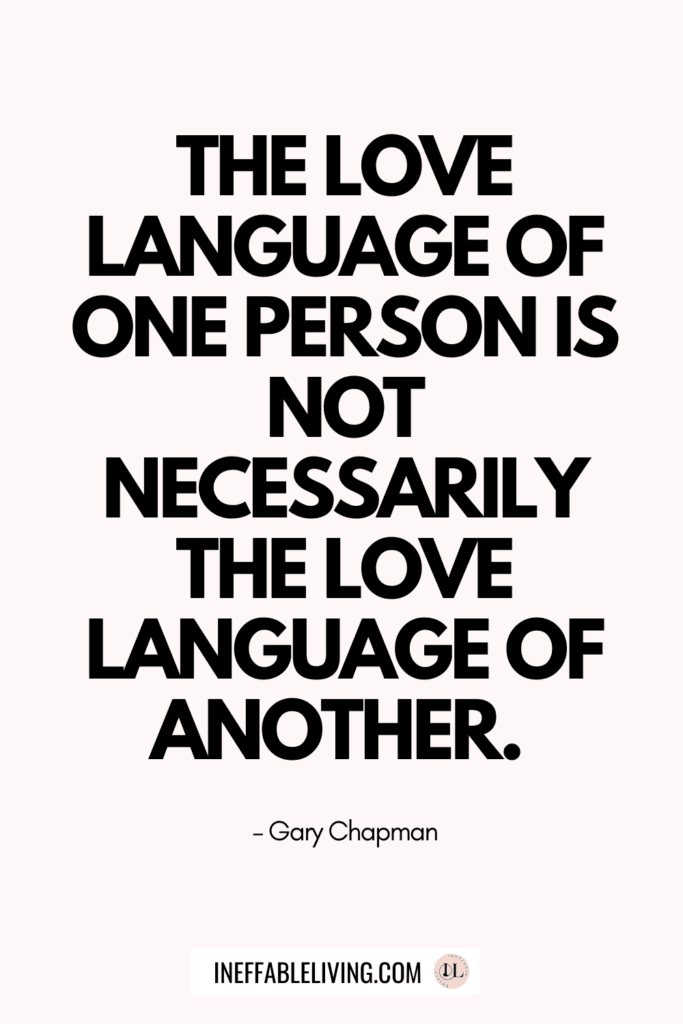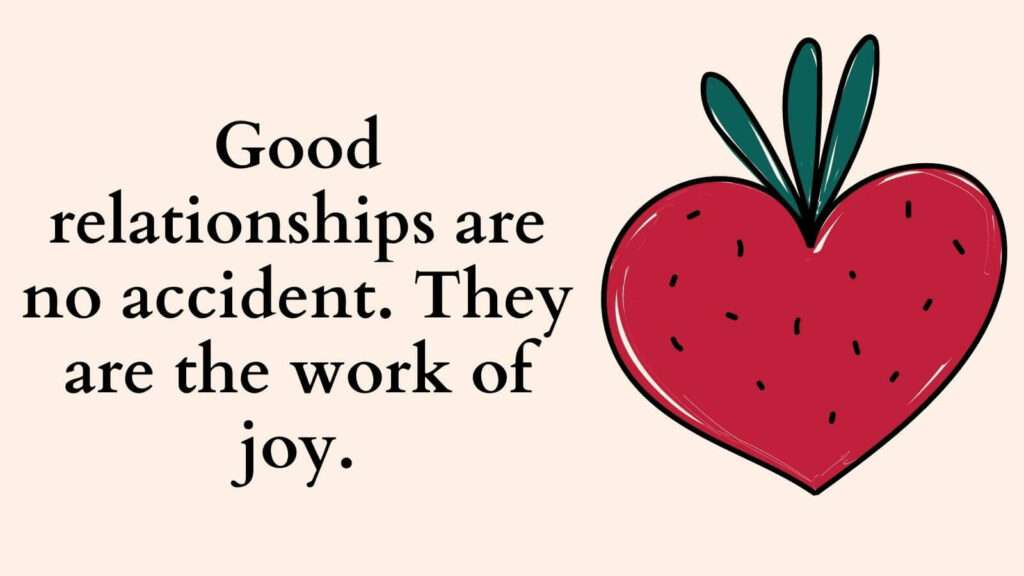This post contains some of the best love language quotes.
What Is Love Language?
Love language is the way in which a person prefers to receive love and affection from others.
It can be one of the five categories, namely:
1. Words of Affirmation: This involves expressing love through words that build up and encourage your partner.
2. Quality Time: This refers to giving your undivided attention to your partner and spending quality time together.
3. Receiving Gifts: This refers to showing love through gifts, which can range from small tokens to grand gestures.
4. Acts of Service: This involves showing love by performing acts of service, such as cooking, cleaning, or running errands.
5. Physical Touch: This involves showing love through physical touch, such as hugging, kissing, or holding hands.
Understanding your partner’s love language can help you communicate your affection in a way that is most meaningful to them.
Love Language Quotes
1. “Your emotional love language and the language of your spouse may be as different as Chinese from English. No matter how hard you try to express love in English, if your spouse understands only Chinese, you will never understand how to love each other.” – Gary Chapman
2. “We must be willing to learn our spouse’s primary love language if we are to be effective communicators of love.” – Gary Chapman
3. “My conclusion after thirty years of marriage counseling is that there are basically five emotional love languages—five ways that people speak and understand emotional love.” – Gary Chapman
4. “The number of ways to express love within a love language is limited only by one’s imagination. The important thing is to speak the love language of your spouse.” – Gary Chapman
Related: Top 25 Relationship Journal Prompts (+FREE Worksheets PDF)
5. “The children who feel loved by their parents and peers will develop a primary emotional love language based on their unique psychological makeup and the way their parents and other significant persons expressed love to them. They will speak and understand one primary love language. They may later learn a secondary love language, but they will always feel most comfortable with their primary language.” – Gary Chapman
6. “Children who do not feel loved by their parents and peers will also develop a primary love language. However, it will be somewhat distorted in much the same way as some children may learn poor grammar and have an underdeveloped vocabulary.” – Gary Chapman
7. “Seldom do a husband and wife have the same primary emotional love language. We tend to speak our primary love language, and we become confused when our spouse does not understand what we are communicating. We are expressing our love, but the message does not come through because we are speaking what, to them, is a foreign language.” – Gary Chapman
8. “Once you identify and learn to speak your spouse’s primary love language, I believe that you will have discovered the key to a long-lasting, loving marriage. Love need not evaporate after the wedding, but in order to keep it alive most of us will have to put forth the effort to learn a secondary love language.” – Gary Chapman

9. “We cannot rely on our native tongue if our spouse does not understand it. If we want him/her to feel the love we are trying to communicate, we must express it in his or her primary love language.” – Gary Chapman
10. “Understanding the five love languages and learning to speak the primary love language of your spouse may radically affect his or her behavior. People behave differently when their emotional love tanks are full.” – Gary Chapman
11. “If you are not a man or woman of words, if it is not your primary love language but you think it may be the love language of your spouse, let me suggest that you keep a notebook titled “Words of Affirmation.” When you read an article or book on love, record the words of affirmation you find.” – Gary Chapman
12. “The love language of one person is not necessarily the love language of another.” – Gary Chapman
13. “Like words of affirmation, the language of quality time also has many dialects. One of the most common dialects is that of quality conversation. By quality conversation, I mean sympathetic dialogue where two individuals are sharing their experiences, thoughts, feelings, and desires in a friendly, uninterrupted context.” – Gary Chapman
14. “If her primary love language is quality time and her dialect is quality conversation, her emotional love tank will never be filled until he tells her his thoughts and feelings.” – Gary Chapman
Related: How to Avoid A Low Value Man & Find The Right One?
15. “If you need to learn the language of quality conversation, begin by noting the emotions you feel away from home. Carry a small notepad and keep it with you daily. Three times each day, ask yourself, “What emotions have I felt in the last three hours? What did I feel on the way to work when the driver behind me was riding my bumper? What did I feel when I stopped at the gas station and the automatic pump did not shut off and the side of the car was covered with gas? What did I feel when I got to the office and found that my secretary had been assigned to a special work project for the morning? What did I feel when my supervisor told me that the project I was working on had to be completed in three days when I thought I had another two weeks?” – Gary Chapman
16. “What’s in it for me? The pleasure of living with a spouse who feels loved and knowing that I have learned to speak his or her love language fluently.” – Gary Chapman
17. “If you discover that your spouse’s primary love language is receiving gifts, then perhaps you will understand that purchasing gifts for him or her is the best investment you can make. You are investing in your relationship and filling your spouse’s emotional love tank, and with a full love tank, he or she will likely reciprocate emotional love to you in a language you will understand.” – Gary Chapman
18. “Physical presence in the time of crisis is the most powerful gift you can give if your spouse’s primary love language is receiving gifts. Your body becomes the symbol of your love. Remove the symbol, and the sense of love evaporates.” – Gary Chapman
19. “All five love languages challenge us to give to our spouse, but for some, receiving gifts, visible symbols of love, speaks the loudest.”
Related: How To Save Your Relationship From A Breakup? 5 Steps To Strengthen Your Relationship
20. “Putting away shoes, changing a baby’s diaper, washing dishes or a car, vacuuming, or mowing speaks volumes to the individual whose primary love language is acts of service.” – Gary Chapman
21. “My spouse’s criticisms about my behavior provide me with the clearest clue to her primary love language. People tend to criticize their spouse most loudly in the area where they themselves have the deepest emotional need. Their criticism is an ineffective way of pleading for love. If we understand that, it may help us process their criticism in a more productive manner.” – Gary Chapman
22. “Learning the love language of acts of service will require some of us to reexamine our stereotypes of the roles of husbands and wives.” – Gary Chapman
23. “Physical touch is also a powerful vehicle for communicating marital love. Holding hands, kissing, embracing, and sexual intercourse are all ways of communicating emotional love to one’s spouse. For some individuals, physical touch is their primary love language. Without it, they feel unloved. With it, their emotional tank is filled, and they feel secure in the love of their spouse.” – Gary Chapman
24. “Sexual intercourse, however, is only one dialect in the love language of physical touch. Of the five senses, touching, unlike the other four, is not limited to one localized area of the body. Tiny tactile receptors are located throughout the body. When those receptors are touched or pressed, nerves carry impulses to the brain. The brain interprets these impulses and we perceive that the thing that touched us is warm or cold, hard or soft. It causes pain or pleasure. We may also interpret it as loving or hostile.” – Gary Chapman
25. “Physical touch can make or break a relationship. It can communicate hate or love. To the person whose primary love language is physical touch, the message will be far louder than the words “I hate you” or “I love you.” – Gary Chapman
26. “Implicit love touches require little time but much thought, especially if physical touch is not your primary love language and if you did not grow up in a “touching family.” Sitting close to each other on the couch as you watch your favorite television program requires no additional time but may communicate your love loudly. Touching your spouse as you walk through the room where he is sitting takes only a moment. Touching each other when you leave the house and again when you return may involve only a brief kiss or hug but will speak volumes to your spouse.” – Gary Chapman
Related: Top 10 Emotional Needs Of A Woman & A Man In A Relationship
27. “Once you discover that physical touch is the primary love language of your spouse, you are limited only by your imagination on ways to express love.” – Gary Chapman
28. “Discovering the primary love language of your spouse is essential if you are to keep his/her emotional love tank full.” – Gary Chapman
29. “What is your primary love language? What makes you feel most loved by your spouse? What do you desire above all else? If the answer to those questions does not leap to your mind immediately, perhaps it will help to look at the negative use of love languages. What does your spouse do or say or fail to do or say that hurts you deeply?” – Gary Chapman
30. “Learn me then you will understand my love language.” — Ojtiwa
5 Love Languages Worksheet
References
- Portions of this article were adapted from the book The Five Love Languages, © 1992 by Gary Chapman. All rights reserved.



